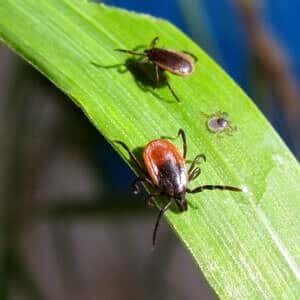
Headlines this week report that Lyme disease cases are surging. Insurance claims between 2007 and 2021 for this tick-borne infection increased nearly fourfold in rural areas. The black-legged ticks that carry Borrelia burgdorferi have been expanding their territory. (B. burgdorferi is the pathogen that causes infection.) Most people know that this problem is serious in New England. However, claims also rose dramatically in New Jersey. The CDC reports that there is a high incidence in mid-Atlantic states as well as Virginia, West Virginia, Wisconsin and Minnesota.
Ticks Are on the Move:
The ticks (Ixodes scapularis and Ixodes pacificus) that carry Lyme disease are becoming ubiquitous throughout the United States. According to the CDC, these ticks, also termed deer ticks or black-legged ticks, are now found in nearly 50 percent of U.S. counties. That is up from only 30 percent of the counties in 1998 (Journal of Medical Entomology, March 2016 ). Although the ticks are very widespread, not all of them carry the pathogens (Journal of Medical Entomology, May 2021). Borrelia distribution is somewhat more limited.
Lyme Disease Can Be Serious:
Lyme disease is transmitted by ticks but it is caused by bacteria called Borrelia burgdorferi. The infection can cause fever, headache, fatigue and joint pain.
Chronic Lyme Disease:
If a patient cannot treat the infection promptly, they risk a chronic condition with neurological symptoms such as numbness, pain or tingling in the hands and feet along with cognitive difficulties. Muscles, bones and tendons may also be affected. These symptoms can be very difficult to diagnose and treat. You can learn more about the complexity of Lyme disease and some associated infections such as Bartonella from our interview with Edward Breitschwerdt, DVM, and B. Robert Mozayeni, MD.
Lyme Disease and the Heart:
Some people develop irregular heartbeats or damage to the heart muscle. To learn more, you may wish to listen to our one-hour interview with Dr. Neil Spector, author of Gone in a Heartbeat: A Physician’s Search for True Healing. Dr. Spector needed a heart transplant after years of suffering with untreated Lyme disease. Sadly, he died of complications in 2020.
Tick Checks Need to Become Routine:
As this tick-borne disease continues to spread, people will need to become more vigilant about checking for ticks and reporting bites and symptoms to their health care providers. Health care systems around the country will need to acknowledge Lyme disease as a possibility. Saying “it doesn’t happen here” will no longer be appropriate.
Citations
- Eisen RJ et al, "County-scale distribution of Ixodes scapularis and Ixodes pacificus (Acari: Ixodidae) in the continental United States." Journal of Medical Entomology, March 2016 DOI: 10.1093/jme/tjv237
- Fleshman AC et l, "Reported county-level distribution of Lyme disease spirochetes, Borrelia burgdorferi sensu stricto and Borrelia mayonii (Spirochaetales: Spirochaetaceae), in host-seeking Ixodes scapularis and Ixodes pacificus ticks (Acari: Ixodidae) in the contiguous United States." Journal of Medical Entomology, May 2021. DOI: 10.1093/jme/tjaa283

